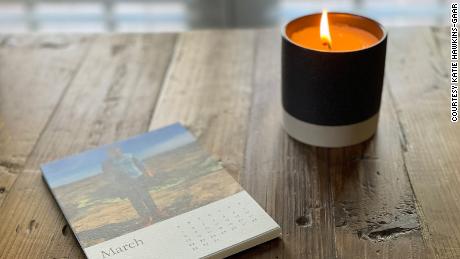Analysis by Katie Hawkins-Gaar, CNN
Updated 1:07 PM ET, Sat March 13, 2021

If you're feeling extra heavy one year after Covid-19 was declared a pandemic, you might be experiencing what psychologists call "the anniversary effect."
(CNN)It's been one year since Covid-19 was declared a pandemic. That's 365 days, give or take, since we've hugged our friends, visited our relatives, gone to the movies or traveled to a faraway place without worrying about the consequences. Twelve months since we last shook a colleague's hand, heard the roar of a crowd or left the house without needing a mask. A full orbit around the sun since we've been able to fully relax.
If the weight of all of those things is taking an extra toll on you lately, you're not alone.
You might be experiencing what psychologists call "the anniversary effect." As therapist and counselor Susan Harrington explains, our bodies and brains store painful memories that can be triggered by certain dates or seasons, such as the death date of a loved one, the annual reminder of a serious diagnosis, or, perhaps, the one-year anniversary of a pandemic.
Losing our sense of control during the pandemic
I'm well familiar with the anniversary effect. I experience it each February, around the date of my husband's death. I feel it every September, as my once-happy wedding anniversary is steeped in sorrow. I face it again in November, on the day my dad died.
My response to these anniversaries changes with time. Sometimes I have trouble sleeping at night or focusing during the day. I become more irritable, more easily frustrated, more anxious. I might cry at seemingly random things. Other times, I'll feel inexplicably exhausted. Almost always, I wonder what's wrong with me. That is, until I remember the date.
Harrington reassures me that these reactions are normal and acknowledging grief anniversaries is healthy. "We tell ourselves that if 'I don't think about it, I won't feel it,' but that's not true," she said. "Because we are living it, we are experiencing it."
Harrington, who is the founder and owner of Maison Vie New Orleans, said she's witnessed how challenging the August 29 anniversary of 2005's Hurricane Katrina can be for her clients. Allowing ourselves to feel all of the emotions that come up with difficult anniversaries is the right thing to do, Harrington explained. "Grief is normal, it's natural, it's expected, it's important."
A year into the pandemic, it's time to take stock of our mental health
Perhaps like you, I'm currently feeling the dread of the Covid-19 anniversary. Whereas many grief anniversaries are something we suffer through solo, the pandemic is an event we're experiencing simultaneously. You might be in a pretty bad mood lately; chances are, your coworkers, neighbors and friends are too.
Even if you haven't lost someone to the pandemic, there's still plenty to grieve. We've missed out on important events and had to postpone meaningful celebrations. Our routines, social lives and sense of security have shifted dramatically. And witnessing the massive death toll -- some 530,000 Americans killed and counting -- affects all of us, whether we consciously realize it or not.
Harrington urges her clients to practice kindness, consideration and compassion -- with themselves and others. "Because we're so scared right now, we're locking into our beliefs," she said. "Change is scary; it brings up anxiety. But we have to remember that other people are scared, too."
Unfortunately, sitting with those feelings can be difficult. The death toll keeps climbing. Mask mandates keep changing. We have very few, if any, chances to catch our breath and take a break from work or parenting or making the same tired dinners every week. Finding the time and space to process all of the sadness we're feeling seems near impossible.
To make matters worse, Harrington said that many Americans are facing long waiting lists for therapists.
Still, there are small things you can do to help yourself get through this period. "The biggest piece is routine and structure," Harrington said. She recommends getting at least eight hours of sleep and structuring your day in a way that offers some comfort and predictability.
Harrington also encourages getting creative with human contact and physical touch -- whether that's extending your quarantine bubble to include a trusted close friend or safely giving a loved one a "hug," pressing against each other back-to-back.
"Those two things, routine and touch, are extremely important for our well-being," she said.
With an accelerated vaccine rollout and herd immunity possibly on the horizon, there seems to be a light at the end of the Covid tunnel, but we're not there yet. We'll experience plenty of emotional ups and downs as we inch closer to a sense of normalcy -- whatever that means these days. We'll have weeks when we feel like giving up and times when we feel like we're navigating everything just fine.
I know, because I've been there.
The key to get through it all is to be gentle with ourselves and others, especially now, on this not-so-happy anniversary.
Katie Hawkins-Gaar is a writer based in St. Petersburg, Florida. She sends out a weekly newsletter called "My Sweet Dumb Brain."
Source
No comments:
Post a Comment